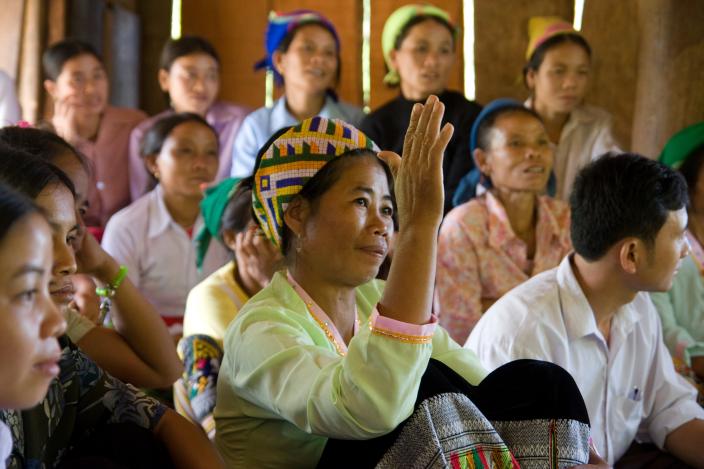COVID-19 is posing enormous challenges to the ASEAN region. In addition to health and economic crisis, FDI inflows into Asian developing countries are predicted to decrease by 30-40% and tax revenues are collapsing. ASEAN has to make choices, whether to build recovery based on more wasteful competition between countries to attract investment or to choose coordination, cooperation and joint hands for sustainable tax revenue to spend on health and education services and other public goods which are essential to fight poverty and inequalities.
The workshop “Towards sustainable FDI attraction in ASEAN: Business environment is the key driver” in Ha Noi on 11th November 2020 shares findings from a recent research by Oxfam and partners, and emphasizes the importance of coordinated efforts by ASEAN governments to stop redundant incentive packages and prioritize enhancing business environment for investment promotion.
Before the pandemic, countries in the ASEAN region were already competing with one another in a race to the bottom by offering excessive tax and non-tax incentives to attract foreign direct investment (FDI) without real value generation. Instead of building business environment which has been proven to be the key determinant of FDI location decisions, all governments in the region have adopted wasteful and aggressive tax policies that have mainly only benefited large foreign companies, according to a recent research by Oxfam and partners. In response to the pandemic and in views to build sustainable development, ASEAN region needs to avoid falling into a trap of needless competition.
Over the last 10 years, countries in the ASEAN region have been competing in reducing their Corporate Income Tax (CIT) rates and offering aggressive tax incentives to foreign multinational corporations. As a result, ASEAN’s average CIT rate has declined from 25.1% in 2010 to 21.7% in 2020. In addition to CIT cuts, the use of other enormous profit-based incentives to attract FDI, like tax holidays, are prevalent in ASEAN countries. The costs of redundant fiscal incentives can exceed the benefits of additional FDI, undermining national tax revenues without evidence of return. Lost budget revenue due to corporate tax incentives was estimated to be 6% GDP in Cambodia and 1% GDP in Vietnam and the Philippines .
“These tax incentives can produce negative externalities that are harmful to economic efficiency. ASEAN countries can’t afford that in the turmoil of the economic and social crisis our countries are suffering. We need to make the choice, whether building sustainable land resilient societies better prepared to face future shocks, whether to help some companies to only be minimizing their tax bills. Who is coming first?” said Ah Maftuchan, Executive Director of The PRAKARSA.
Besides tax incentives, the use of non-tax incentives has been widespread among ASEAN countries and exacerbated the race to the bottom in the region. The competition in providing non-tax incentives is centred on land incentives. Long-term land lease is available in all ASEAN countries, and Thailand even allows foreign investors to own land in some special cases. Vietnam and Laos provide rent exemption or reduction to investment projects in hardship regions or promoted production activities.
This competition in land incentives among ASEAN countries is subsequently enlarging the socio-economic inequality, and the non-transparent mechanism of granting land incentives in Cambodia, Laos, and Myanmar is opening opportunities for corruption and rent seeking .
“While competing in business environment is a race to the top, competing in tax and land incentives is a race to the bottom. The granting of land incentives, particularly the extension of leasehold term, lacks transparency, which may increase the risks of corruption”, said Dr. Nguyen Duc Thanh, Co-founder and Chief Advisor, Vietnam Institute for Economics and Policy Research (VEPR).
The ASEAN region is experiencing unprecedented economic inequality, as some countries still have the highest poverty levels in the world and most countries in the region are failing to invest sufficiently in essential public services. COVID-19 will only amplify poverty and inequality due to the differences in the ability to secure jobs and in the levels of access to health care. Myanmar, Indonesia, Vietnam, and the Philippines are among top 20 largest increases in poverty headcount ratios over the world due to COVID-19.
Unnecessary tax and non-tax incentives affect countries’ capacity to mobilize domestic revenue and therefore spending levels on public essential services to face the pandemic by fighting poverty and reducing inequality. “The absurd situation is that they may not necessarily determine the level of FDI inflows as many policy makers often think.” said Dr. Nguyen Duc Thanh, Co-founder and Chief Advisor, Vietnam Institute for Economics and Policy Research (VEPR).
Many researches find that business environment indicators are key determinants of FDI location decisions, such as economic stability, political stability, local markets, transparency of legal framework, labor quality, the quality of infrastructure, particularly the density of high-quality roads...
The report, building upon comparative experiences of other regions and exploring case studies from ASEAN, makes five recommendations for ASEAN countries to act cohesively: set up black and whitelists of tax incentives clarifying harmful taxation; stop the competition in providing site incentives; agree on a common minimum tax standard; establish rules for the good governance of investment incentives; and agree on a list of business environment factors that are key to attracting FDI.
“ASEAN countries should join hands in the battle of fighting poverty for millions of lives in the region. It’s high time to realize that tax incentives and non-tax incentives are deepening social and economic inequalities, and that is not the key to sustainable foreign investments. Every government needs sustainable revenue to spend on health and education services and other public goods which are essential to fight poverty and inequalities; so, all the member states need to unite to prioritize enhancing business environment instead of giving away ineffective incentives”, said Mustafa Talpur, Regional Inequality Campaign Lead, Oxfam in Asia.
Đọc Thông cáo Báo chí tiếng Việt tại đây.
Notes to the editor:
The launch event will be live-streamed on 11th November, 2 pm ICT (GMT +7) at: https://www.facebook.com/VEPRinstitute/
